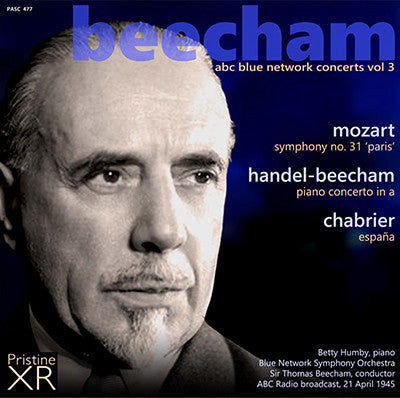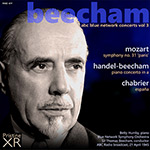
This album is included in the following sets:
This set contains the following albums:
- Producer's Note
- Full Track Listing
- Cover Art
Third of four newly-discovered broadcast concerts by Beecham at the nascent ABC in 1945
"In New York he whipped up a quite different and more kinetic kind of storm"
- MusicWeb International
Following the hastily-arranged and sombre affair of Beecham's second Blue Network Symphony Orchestra concert (PASC470), his third engagement saw something of a return to normal service, and some far more upbeat commentary from Milton Cross than was heard at the Roosevelt Memorial Concert of Volume Two.
Once again we have a "Handel-Beecham" radio première, following on in this respect from the first concert (PASC461). This time the work was a Piano Concerto in A, with the soloist one Betty Humby, who two years previously had become Lady Beecham when she married the conductor, some 29 years her senior, before a police justice in Manhattan. Described by a reviewer as "a straightforward arrangement of themes with the typical Beecham touch", the musical duo had already made a studio recording of the concerto in the January of 1945 with the London Philharmonic, one of a number of recordings Beecham made at the time which remained unissued for contractual reasons until copyright expired in the 1990s.
As with the previous volumes, sound quality from these 33rpm transcription discs is on a par with good AM broadcasts, greatly assisted by XR remastering.
Andrew Rose
MOZART Symphony No. 31 in D major, "Paris", K297
HANDEL-BEECHAM Piano Concerto in A major
CHABRIER España, Rhapsodie pour orchestre
Live broadcast on ABC/Blue Network, 4pm, 21 April 1945
Ritz Theater, W. 48th Street, New York City
Announcer: Milton Cross
Betty Humby, piano
Blue Network Symphony Orchestra
Sir Thomas Beecham, conductor
Reviews: MusicWeb International & Audiophile Audition
At the fiery conclusion, the audience roar clearly expresses their recognition of a true “lollipop”
The third volume of this series (Volume 1 ~ Volume 2)
traces a congenial concert of Mozart, Handel and Chabrier that is all
over well within the hour. The central work is that hyphenated and
hyperbolic construction, the Handel-Beecham Piano Concerto. In this the
Bart has ransacked some memorable themes to stitch together a concerto
of sorts, a vehicle for his new wife Betty Humby who here gives the work
its first radio broadcast. The premiere had been given a little
earlier, on 15 March 1944, again in New York. As Andrew Rose notes,
Beecham and Humby recorded it in London the following year but he is not
quite right in his dating. Most of the recording comes from January
1945 but the Romanza was set down successfully in October of
that year (the then unpublished performance can now be found on Somm).
There are no huge interpretative differences in as slight a piece as
this, but it is noticeable that the very stately opening was tightened
up a few months later in the London studio inscription. This charming
work, full of rococo trills and burnished romance, is graced by
excellent string playing – fully affetuoso when called for - an
especially fine first flautist, and a few minor digital derailments
from Humby. As picked up by the microphone, her piano tone isn’t quite
centred in the balance; it tends to be a bit recessive.
Beecham
was still in his early-mid period approach to Mozart’s symphonies.
However beautifully shaped some later recordings were, there was
sometimes a hint of too-manicured phrase tapering. Here he takes the Paris
with all his accustomed vitality. His earlier LPO recording, which can
be found on Dutton and elsewhere, is full of the kind of swagger and
driving intensity that can be heard in this New York reading. The lower
strings shine, the forward tuttis register powerfully, and the elegant
and Andante never drags. Elegance and trenchancy are held in perfect
equipoise. As a bonus we hear one of his encore favourites, a piece he
loved playing and recording – Chabrier’s España. Deftly
rhythmic and virtuosic it elicits voracious, applause which bulks up the
playing time to precisely the 6:30 or so he took in his RCA reading. In
New York he whipped up a quite different and more kinetic kind of
storm.
On my review copy rogue discographic information
relating to a Rudolf Kempe disc has migrated to the back of the jewel
case, though this is presumably easy to correct. The engineering is fine
and it’s always good to hear announcer Milton Cross adding period
flavour to the proceedings.
Jonathan Woolf
MusicWeb International
The concert by Sir Thomas Beecham and the “Blue Network Symphony Orchestra” of 21 April 1945 certainly assumes a more optimistic tone than that which occurred as President Franklin Roosevelt had been laid to rest. The high energy of the occasion bursts forth immediately, with Mozart’s 1778 D Major “Paris” Symphony, expressly conceived to parody the musical conceits of the day, such as the so-called premier coup d’archet, or the Parisian version of unison Mannheim rocket figures at a symphonic opening. The addition of trumpets and tympani – and the clarinets – increases the often ceremonial pomp of the performance. Throughout the performance, Beecham emphasizes the suave grandeur Mozart controls in this, his largest symphonic structure in his oeuvre at the time. The virtuoso syncopations of the last movement move with a lithe suppleness that makes this rendition a worthy companion to Beecham’s commercial endeavor with the Royal Philharmonic Orchestra.
Beecham himself arranged various Handel melodies and tropes to create the four-movement Piano Concerto in A, expressly for his new wife, Betty Humby. Handel emerges as a Romantic, his textures lush and flavored by all sorts of nice touches between the keyboard and the woodwinds, especially in the middle movement Romanza. The first movement Chaconne exploits a bass pattern we know from Edwin Fischer’s early recording. The Menuet movement, staid and galant, embodies the soul of aristocratic elegance. Despite the “popular media” version of Handel proffered by the Beechams, the effect has its moments of intimacy and elated fervor. With the Finale’s glad spirits, we have a concertante pastiche of Handel pleasantry. Humby performs with a speed and lithe grace that suggest she would have been a natural acolyte of the Mendelssohn concertos.
Beecham called Chabrier’s Espana “the best of quasi-Spanish music yet written.” In one Leonard Bernstein’s Harvard lectures, he pointed out the “poetic,” architectural and symmetrical features in Chabrier’s brilliant scoring for this “Rhapsodie.” The Blue Network horns and winds, as they had been in the Mozart, project a brisk, alert sonority, fresh and vivid, as tends to be Chabrier’s wont. At the fiery conclusion, the audience roar clearly expresses their recognition of a true “lollipop.” The restored sound by Andrew Rose raises the level of sonority well above anything like AM radio.
—Gary Lemco
Audiophile Audition

